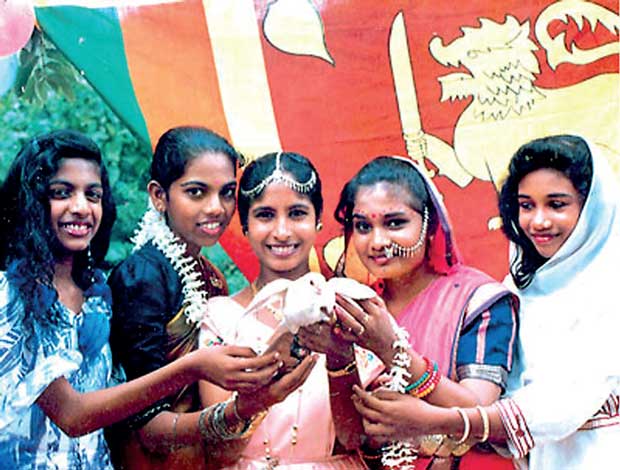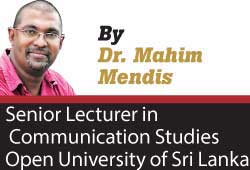Reply To:
Name - Reply Comment
Last Updated : 2024-04-26 06:40:00

This is although for years we have been critical of the overall system that prevailed and aspired clear-cut changes for the common good. If the change we wanted was clear enough in our minds, we wouldn’t have, for instance, permitted the January 8th Regime to make a mockery of the will of the people by bringing rejected candidates through the back door. This I say as someone who respects democracy and believe in highest democratic benchmarks of governance
As to what change we wanted is the priceless question as the pace of change has also not been in line with what is expected of a newly mandated regime inspired by ‘Good Governance’. They seldom realise that the clock ticks faster and the days are numbered for all regimes. Such sentiments have been expressed by the current leader of the opposition, Mr. R Sampanthan too as a much-respected elder statesman who obviously has national interests in mind.
At a time when we hear many say the country needs to have more educated people in legislature and provincial bodies, the expectation is probably to see an end to regressive policy development and practices. Going by what we continue to see, the question is whether we need an intelligentsia that will appease people who are alien to democratic values and promote through ignorance and inaction, regressive forms of nationalism? Today, people are reluctant to respect educated men and women who hold public office as they are considered shameless, often making grand pronouncements that they don’t mean.
People say the actions of leaders of the political left and right are unthinkable, as it is the innocent people who were at the receiving end of all things, despite lesser education in terms of formal credentials. People remember a highly celebrated leader of the so called Left Movement who made his position clear on language issues by eloquently proclaiming, “Two Languages, One nation: One language, two nations”. But the very same people failed regarding constitutional reforms through the First Republican Constitution of 1970, in laying the foundation for a nation of unity in diversity based on equality.
It is a shame that such people fed more to partisan religious and linguistic nationalism, conferring special status to one religion and language over other religions and languages, while the moderates in this country wanted to see a constitution that respected the fundamental rights of all people protected in line with the Universal Declaration of Human Rights, ensuring for instance, the right to worship.  That is the lesson from India for us. The position was equally shameless regarding language as there were those who led this country by instigating tribal sentiments with ‘Sinhala Only’ policies, indifferent to its consequences.
That is the lesson from India for us. The position was equally shameless regarding language as there were those who led this country by instigating tribal sentiments with ‘Sinhala Only’ policies, indifferent to its consequences.
What we see even at this stage of unprecedented and complex socio-political issues are the apologists for the same policies, trying to justify how important it was then to restore the dignity of the Sinhala majority about their language and the religion of the majority in post-independent Sri Lanka. Hence we hear on and off, even at present, the arrogant statements against equality that we shall never do anything that will undermine the interest of the majority.
This again will not be countered by any one so easily as this nation is not quite blessed by men of high integrity and character in leadership who can take a stand that will be respected by all people. That is the lesson we can learn from Singapore with superior thinking on these lines. Singaporeans include not only the principal minorities but also smaller groups like the Eurasian and the indigenous communities. We need to remind the new regime we ourselves created that post-war Sri Lanka needs no lip service to grand concepts that leaders ironically cannot perceive with depth but decisive changes that will at least ensure that our future will not be as bleak as the past.
Is acute normlessness or anomie a condition that social institutions should deliberately promote? In recent times, we have been witnessing and reading in the national newspapers, about how members of the clergy threaten and even physically intimidate their members, making a mockery of the religious order they represent. Some were intimidated verbally as well as physically and very little has been done to discipline such clergy by their own hierarchy or by the laws of the land.
The situation is even more serious if they belong to the religion that the constitution proclaims so proudly as the state religion, as the government that habitually washes its hands off most public issues cannot be indifferent in this situation as well. The government is not carrying the obligation to ensure that the highest standards are maintained by clergy who belong to the state religion.
These problems are seen in other religions, including my own religion. The Christian Ministry of this country with different splinter groups acting with utmost impunity have been permitted to operate without registering with the National Christian Council (NCC) and the Evangelical Alliance is a shame indeed. Without adhering to principal benchmarks stipulated, we only see greater room for regressive nationalistic forces to raise their heads and make life difficult for those who are sincere devotees, irrespective of the religion they belong to.
There are splinter groups even among Christians who have taken the law into their own hands and prevent people from partaking of Holy Communion, as they have married members of other religions. These things happen with the total blessings of the Christian Affairs Ministry, in the way Ministries in charge of other religions remain inactive regarding standards they should maintain, at whatever cost. The Ministers in respective subjects need to be more inspiring for the public to respect them.
The position of the state regarding the ethno-political crisis
It is unthinkable that the governments elected by the people in post-independent Sri Lanka have failed to take a clear-cut position on how they wish to provide a clear-cut solution to the ethno-political crisis that has plagued this land for decades. Thousands of lives have been lost but the minds of those who aspire to be in national leadership have not been opened. The war that was fought ended with a most questionable position taken by the leadership of the previous regime that there are only two groups of people in this land, known as the Patriots and Traitors. That those with the government irrespective of their ethnicity and other differences are Patriots and the rest are Traitors was not a position the people of this country irrespective of their status ever wanted to tolerate.
It is ironic that these leaders who were rejected by the people have not made a fair assessment of the reasons for their own downfall. Despite a ‘feeling good peaceful environment’, it is shocking that the present regime has not moved ahead convincingly in winning the confidence of the minorities on the real political problems they encounter. Empty rhetoric should be ended on all these issues urgently, with the government taking its commitment to restore good governance in all principal frontiers that remain an annoyance to the people.
Enlightened opinion formation is not easy as I have already stated in this article. What the country needs in a formidable sense is a strong foundation of nation-building in all frontiers based on democratic values. It looks like those who talk about good governance also believe such a grand project is possible within an autocratic culture too.
The country has suffered immensely due to unprincipled political leaders who have never had the backbone to stand firm on democratic values. It is similar to the eloquently proclaimed need for two languages for one nation ending up with the extraordinary position of advocating one religion over other religions.
The media as well as the academia in a developing country have a very special role to play in creating an enlightened public, as many remain unenlightened on core principles of democracy. The freedom that we have today in the aftermath of defeating an oppressive regime that believed in abducting and killing anyone with dissenting views should be used more responsibly. Those freedoms will not be ours very soon, if we, as a nation prove once again that we are not prepared to learn lessons from the past. It is time that the broad-based national mass media institutions take their role more seriously, instead of conferring status to what could set our beautiful country alight once again.
Academics are aware of the type of culture required for a university to prosper. However that too becomes an issue as they have not been sources of inspiration to the overall student population in maintaining a healthy dialogue with them on issues of grave national concern. Students take to the streets due to their indifference. In the absence of a culture that is politically more liberal in orientation, what we see is the scope for those with contradictory positions to occupy the space for vibrant discussion and debate devoid of confrontational tactics that burden the less fortunate of the land.

Add comment
Comments will be edited (grammar, spelling and slang) and authorized at the discretion of Daily Mirror online. The website also has the right not to publish selected comments.
Reply To:
Name - Reply Comment
US authorities are currently reviewing the manifest of every cargo aboard MV
On March 26, a couple arriving from Thailand was arrested with 88 live animal
According to villagers from Naula-Moragolla out of 105 families 80 can afford
Is the situation in Sri Lanka so grim that locals harbour hope that they coul